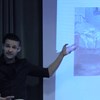getting

Setting priorities during pandemics
This projects aims to present a framework for making sound decisions in times of pandemics - when experience and time is scarce, and uncertainties are many.
Tax Setting and Electoral Accountability with Policy-Motivated Politicians
Professor Eva Mörk, Department of economics, Uppsala University Seminars host is Stefan Svallfors. The seminars are free of charge and take place at 13.00–14.30 in the Institute’s seminar room at Hollä
Stateless Studies in an Age of Artificial Intelligence Challenges, Opportunities & Setting a Future Agenda
Statelessness & Citizenship Review, 2025. From the conclusion We are at a pivotal moment where statelessness studies must engage with research and advocacy on the impact of AI on the field, as well a
‘Humans think outside the pixels’ – Radiologists’ perceptions of using artificial intelligence for breast cancer detection in mammography screening in a clinical setting
Health Informatics Journal Abstract This study aimed to explore radiologists’ views on using an artificial intelligence (AI) tool named ScreenTrustCAD with Philips equipment) as a diagnostic decision su

Data-driven innovation i welfare services and public priority setting with Karim Jebari
Presentation from the workshop "AI and autonomous decision making" at the Institute for Futures Studies in Stockholm, October 2017.

The more things change, the more they stay the same. A follow up of participants in Social Fund financed projects
Research report 2014/5, 77 p. Every year in Sweden, over one hundred thousand job-seekers are assigned to local labour market policy measures, of which a large proportion are financed with money from t
Time to plan for the worst-case scenario
After two of the most damaging hurricanes in history affected the Gulf of Mexico just a few days apart, the impact of climate-induced catastrophes is finally getting some attention. However, in truth,
Disease prioritarianism: A Flawed Principle
Medicine, Health Care and Philosophy, May 2015. DOI 10.1007/s11019-015-9649-2 Disease prioritarianism is a principle that is often implicitly or explicitly employed in the realm of healthcare prioritiz
Knowing the Game: Motivations and Skills Among Partisan Policy Professionals
"Knowing the Game: Motivations and Skills Among Partisan Policy Professionals", Journal of professions and organizations, Advance Access published September 21, 2016, doi: 10.1093/jpo/jow008 Abstract This
Knowing the game: motivation and skills among policy professionals
Working Paper 2016 no.1(Published in Journal of Professions and Organization, Vol 4 (1):55-69 (2017). DOI: https://doi.org/10.1093/jpo/jow008) This paper focuses on “policy professionals”, i.e. people whinfluence the course of affairs, while their working-life satisfaction comes from getting their message into the media without becoming personally exposed. The key resource of policy professionals is context-dependent politically useful knowledge, in three main forms: “Problem formulation” involves highlighting and framing social problems and their possible solutions. “Process expertise” consists of understandingthe “where, how and why” of the political and policy-making processes. “Information access” is the skill to be very fast in finding reliable and relevant information. These motivations and skills underpin a particular professionalism based in an “entrepreneurial ethos”, which differs from both the ethos of elected politicians, and that of civil servants, and which has some potentially problematic implications for democratic governance.








